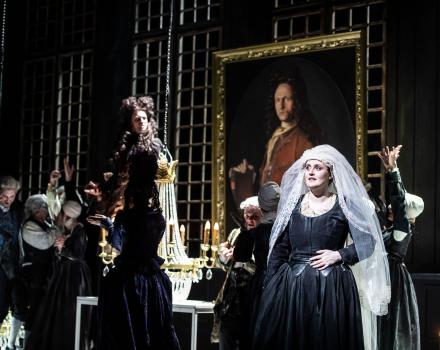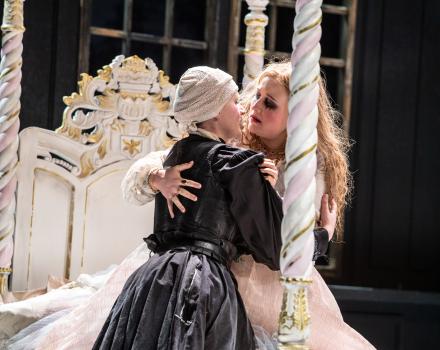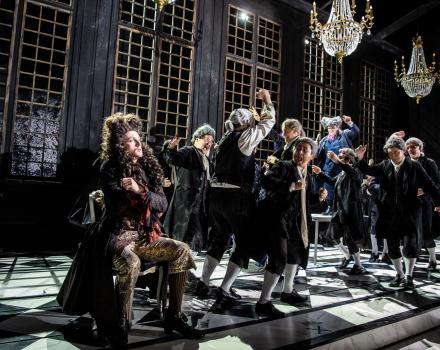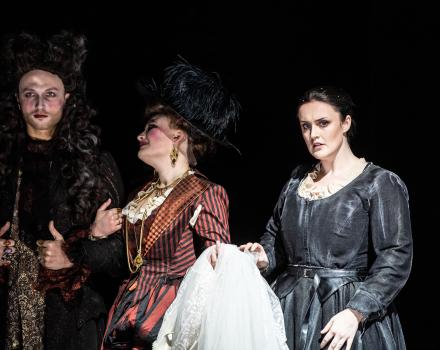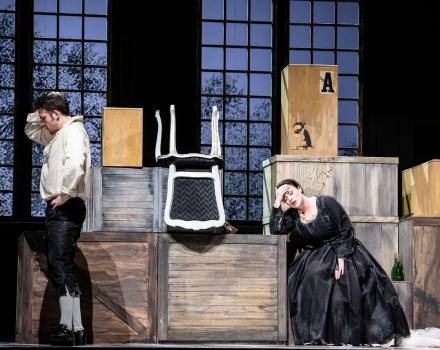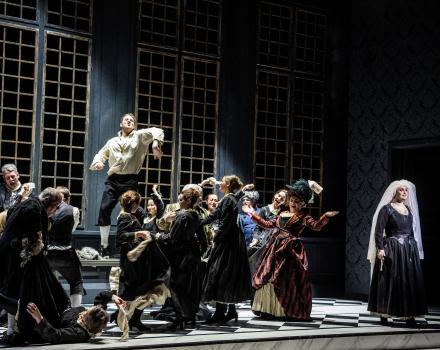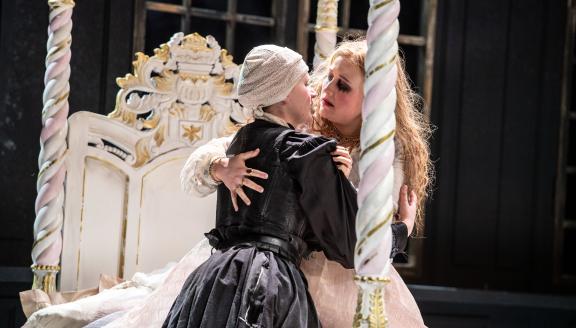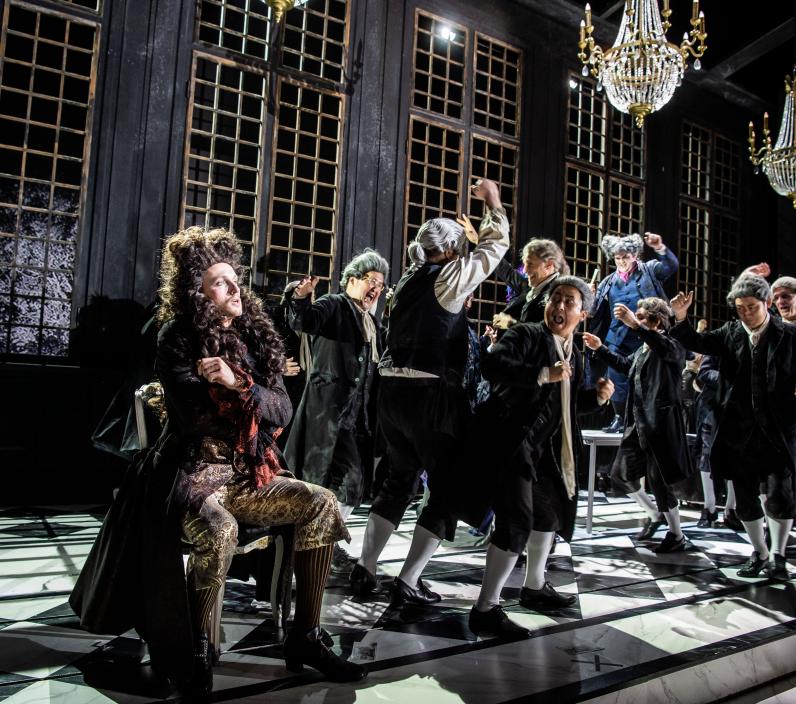

The Marriage of Figaro

A count has designs on his personal valet's fiancée and is determined to stop their wedding taking place. Meanwhile, the countess tries to regain her husband's love by any means necessary.
Mozart's great comic opera is a tale of intrigue, misunderstanding and forgiveness. Director Lydia Steier teases out the touching melancholy of the characters with the mixture of opulence and black humour. Oper! magazine’s ‘Opera house of the year’ in 2020, Staatsoper Hannover is on an artistic high and happy to share this production worldwide via OperaVision.
Cast
|
Count Almaviva
|
Germán Olvera
|
|---|---|
|
Countess Almaviva
|
Kiandra Howarth
|
|
Susanna
|
Sarah Brady
|
|
Figaro
|
Richard Walshe
|
|
Cherubino
|
Nina van Essen
|
|
Marcellina
|
Iris van Wijnen
|
|
Bartolo
|
Daniel Eggert
|
|
Basilio
|
Philipp Kapeller
|
|
Don Curzio
|
Peter O’Reilly
|
|
Barbarina
|
Petra Radulovic
|
|
Antonio
|
Frank Schneiders
|
|
Chorus
|
Chor der Staatsoper Hannover
|
|
Orchestra
|
Niedersächsisches Staatsorchester Hannover
|
| ... | |
|
Music
|
Wolfgang Amadeus Mozart
|
|---|---|
|
Text
|
Lorenzo Da Ponte
|
|
Conductor
|
Giulio Cilona
|
|
Director
|
Lydia Steier
|
|
Sets
|
Momme Hinrichs
|
|
Lighting
|
Elana Siberski
|
|
Costumes
|
Alfred Mayerhofer
|
|
Chorus master
|
Lorenzo Da Rio
|
| ... | |
Video
The story
Act I
It is the day of Figaro’s marriage to Susanna, maid to the Countess. Figaro, valet to the Count, is assessing the bedroom offered to him by his employer; it conveniently adjoins both the Count’s and the Countess’s apartments. Susanna points out that the room will also be ‘convenient’ when the Count chooses to reinstate the ‘Droit de Seigneur’, a feudal practice in which a local Count can ‘deflower the bride;’ a practice that he has recently abolished. Figaro determines to outwit his master.
But Figaro owes money to Marcellina, and has promised to marry her if he does not manage to repay her. He has also raised the ire of Dr. Bartolo, the Countess’s former guardian, for his role in helping bring about the Count’s marriage to the Countess. To complicate matters further, the young page Cherubino wants Susanna to intercede on his behalf with the Count, who has dismissed him from the castle after catching him alone with Antonio’s daughter, Barbarina.
Suddenly the Count shows up, causing disarray. Cherubino hides and hears the Count’s overtures to Susanna. The Count in turn hides, and overhears Basilio, the music master, making insinuations about Cherubino and the Countess. The Count emerges, discovers the unfortunate page, and sends him to rejoin his regiment.
Act II
A weeping Countess laments the loss of the Count’s love. Figaro reveals his plan to outwit the Count: he has sent him an anonymous letter implying that the Countess has a lover. Susanna points out that Marcellina can still invoke the debt and stop the wedding, and a second plan is hatched. Susanna will agree to meet the Count in the garden, but Cherubino will go disguised in her place. Figaro instructs the women to dress Cherubino appropriately.
The page flirts with the ladies by singing his latest composition. When he is half undressed, the Count arrives. Having received Figaro’s letter, he is in a jealous rage. Cherubino, hidden in the closet, knocks over a chair. The Countess, in a panic, pretends that the noise is Susanna, but refuses to unlock the door; meanwhile, Susanna rescues Cherubino, who escapes out of the window. Susanna locks herself in the closet.
The Countess attempts to explain to her husband the presence of Cherubino in her closet. She is as surprised as the Count when it is Susanna who emerges. The two women pretend that the whole episode was a trick to provoke the Count into better treatment of his wife. They confess that the letter was written by Figaro, who then joins them, unaware of the women’s revelations to the Count. When Bartolo, Basilio and Marcellina arrive with a lawsuit to force Figaro’s marriage to Marcellina, the Count is triumphant.
Act III
The Countess and Susanna open the third act with a plan to disrupt the Count’s amorous intentions. Susanna will agree to meet the Count that evening in the garden, but the Countess will go in her place, disguised as her maid.
On the advice of his legal consultant, Don Curzio, the Count insists that Figaro pay Marcellina at once or marry her. Figaro is saved by the timely revelation that he is the long-lost son of Marcellina and Bartolo; everyone but the Count and Don Curzio embraces their new relations.
Finally the wedding celebrations of Figaro and Susanna begin. Cherubino is unmasked among the bridesmaids, but Barbarina shames the Count into allowing him to stay at the castle. Susanna passes the Count the letter dictated by the Countess, confirming her evening rendezvous with him under the pine trees.
Act IV
In the garden everybody is waiting: the Count and Figaro for Susanna; the Countess for the Count; Bartolo and Basilio to witness the revival of the ‘Droit de Seigneur.’ Figaro rails against the faithlessness of Susanna, while she looks forward to the conclusion of her plans.
The appearance of Cherubino is potentially disastrous, but the Count arrives and woos ‘Susanna,’ in fact his wife. The jealous Figaro is then confronted by Susanna, disguised as the Countess, but he recognises his bride and they are reconciled – witnessed by the Count, who believes he sees his wife in the arms of his valet. He denounces her; the real Countess unmasks herself and forgives her husband. The day ends in celebration.
Insights
Four Questions for conductor Giulio Cilona
How can Mozart's music sound alive and ‘new’ in 2022?
After the romanticised Mozart versions of last century, many conductors today look for lively tempi, strong dynamic contrasts and authenticity. Differences in interpretations lie in details unannotated in the score but linked to performance practice at the time. Nowadays, it is often said that the conductor interprets them freely or just relies on a feeling. My teacher Bruno Weil was always very strict about that: ‘In front of such a masterpiece, a conductor must remain a servant of the music.’ Mozart's music needs no extra ‘help’. It's all there, the music is perfection. As a conductor, one’s only task is to draw attention to the small, special details through analysis of the score. And then you have to consider how to add unwritten details to the music to get the most convincing musical result. So, I would say ‘faithful’ rather than ‘new’. Today's tendency to play everything very vividly does not necessarily mean ‘new’. We know that Mozart as a conductor could never conduct his works fast enough; the orchestra could never play fast enough for him. Fresh and lively - it certainly already was in 1786.
What is special about your interpretation? What can audiences look forward to?
I always try to put myself completely in the composer's time. So into a person who only knew the music up to 1786. Our ears of the 21st century have heard everything, and so all too often they miss details, hidden leitmotifs and jokes. I would like to bring out these details and make them accessible to the audience. The audience can look forward to lots of fun, surprising and sparkling musical moments and great emotions. They can also look forward to a great vocal ensemble. The singers will bring a lot of action on stage, every role is important. Everyone in the orchestra pit and on stage must strive for clear articulation and the right level of sound – especially in ensemble numbers – so that together we can achieve the greatest possible transparency or clarity in the music. Everything Mozart wrote down on in the score must be used and played with great meaning. Each note has its own dramatic and rhetorical power.
Is there a special challenge for the Staatsorchester Hannover?
Playing this music on modern instruments is no easy task: it must have effervescence, at the same time the right balance and articulation. As a young conductor, I face Figaro as a challenge, as a repertoire piece that is often played. I have to convince the experienced Staatsorchester of my work and interpretation. Mozart sounds different every evening, we in the orchestra pit flexibly pick up the mood and feelings from the stage. That will be great fun for all of us!
Do you have a favourite part?
The quiet parts where you can let the music flow and the orchestra play. With a few movements I can then show small musical details and enjoy the rest together with the artists on stage. I'm thinking, for example, of the incredible duet that opens Act 3. For me, the opera has the best overture and the best musical or quasi-religious description of a reconciliation ever composed in this world. It simply doesn't get any better than this.
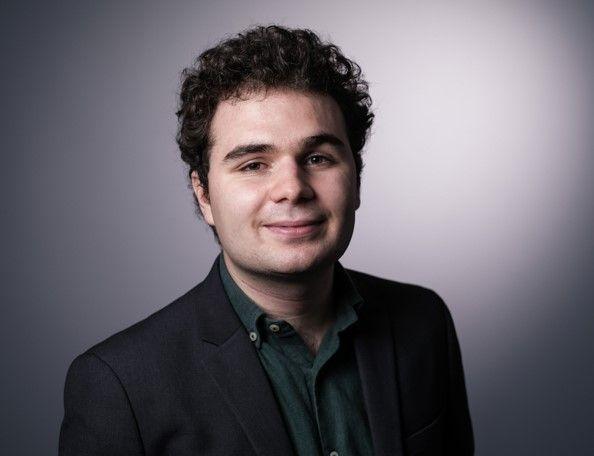
About Giulio Cilona
The Belgian-American conductor, composer and pianist Giulio Cilona was born in Connecticut (USA). After studying piano, composition and conducting in Brussels and Hanover, he completed his studies in orchestral conducting at the Mozarteum University in Salzburg. At the same time, he already worked as assistant to the Generalmusikdirektor at the Landestheater Salzburg and as assistant/repetitor for the Salzburg Easter and Summer Festivals in cooperation with the Dresden Semperoper. At the Mozarteum and at various festivals he has conducted Madama Butterfly, Rigoletto, Alcina, Les Contes d'Hoffmann and Philippe Boesman's Reigen with the Austrian Ensemble for New Music, among others, as well as concert performances of Don Giovanni and Der Freischütz. He was awarded the 2019 Bernhard Paumgartner Medal by the Mozarteum Foundation for his performance of La finta semplice. In the symphonic repertoire, he has worked with numerous orchestras in Europe and conducted Mahler's 5th Symphony at the Stadttheater Wels and Brahms' 2nd Symphony with the Bad Reichenhall Philharmonic, among others. As a pianist, he has won numerous prizes at renowned international piano competitions and has performed with various orchestras. As a composer, he conducted the world premiere of his Concertino for piano and orchestra at the age of 18 and has conducted his own works several times. Since the beginning of the 2020/21 season, Giulio Cilona has been 2nd Kapellmeister at the Staatsoper Hannover, where he has conducted the new production of Hänsel and Gretel, among others.
Gallery
